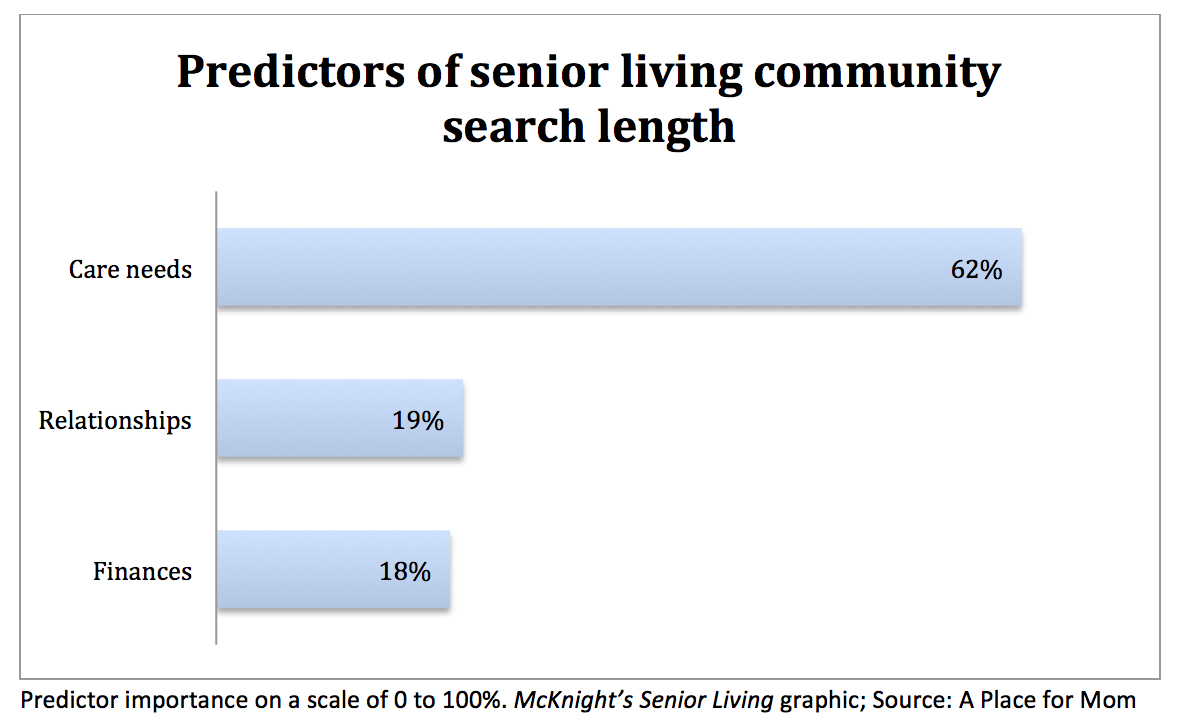
An older adult’s care needs have the greatest effect on the length of time that he or she, or family members, will spend searching for a senior living community, according to new data being released today by A Place for Mom.
“The higher the level of care acuity, the faster families tend to move in,” Ben Hanowell, a data scientist for the senior living referral service, told McKnight’s Senior Living. “People who are good candidates for independent living will take a little bit longer than people who are better candidates for assisted living. And people who are looking for assisted living or a residential care home will take a little bit longer than people who are searching for memory care.” Issues associated with cognitive decline often are associated with the need for assistance with activities of daily living, he added.
 Finances, relationships, time of year and search area income level also affect timing, according to the senior living referral service, but care needs are twice as important as all of the other factors combined.
Finances, relationships, time of year and search area income level also affect timing, according to the senior living referral service, but care needs are twice as important as all of the other factors combined.
The new report is based on a sample of more than 125,000 families that A Place for Mom helped move into U.S. retirement communities, senior apartments, assisted living communities, residential care homes and memory care communities between 2012 and 2015.
The company found that fully mobile seniors take 58 days to find a senior living community, which is 18 days longer than seniors who use a walker and 37 days longer than bedridden seniors. Similarly, seniors who need bathing assistance find a community 28 days faster than fully mobile seniors, whereas those who require medication assistance spend 27 days less time searching, by comparison.
Other highlights:
- Older adults looking by themselves take about twice as long as those who have help (51 days for retirement communities; 47 days for assisted living consumers).
- Older adults with higher incomes and larger monthly budgets for senior care typically take more time to find a senior living community. Families with a monthly budget of $6,000 or more search 29 days longer than those with monthly budgets between $1,500 and $2,000. If a family’s monthly budget is below $1,500, then the search lasts up to 13 days longer compared with those with higher monthly budgets, most likely because finding a place that they can afford takes more time.
- Families searching for senior living in wealthier areas find it more quickly than older adults searching in middle-income areas. Families searching in low-income areas also have faster search lengths, either because of low demand in those areas or because they have limited resources and move into the first community they can afford.
Based on the secondary factors affecting search time, Charlie Severn, A Place for Mom’s vice president of brand marketing, told McKnight’s Senior Living that senior living operators should encourage families to relieve potential future stress by going beyond their initial research efforts to actually make plans, encourage older adults searching alone to ease the decision-making process by involving a family member in the search process, and make available materials that answer prospects’ questions about long-term care financing and accessing Veterans Affairs Aid & Attendance and other benefits.
“Operators or communities that can help families navigate through the situation can put themselves in a better position,” he said.
A Place for Mom released the data in conjunction with the launch of its new interactive tool, Chart Your Course, which is designed to enable people to estimate how long they will take to find appropriate senior living settings by showing them the typical search length for consumers with similar care needs, finances and relationships.
“Unfortunately so many people are stuck with an antiquated idea of senior community living. For most people, it’s a real educational process that they embark upon when a need arises,” Sue Johansen, the company’s director of senior living advisers, West Coast, told McKnight’s Senior Living. “And so the more we can get the dialogue started early, the more awareness there is about what great options there are.”



